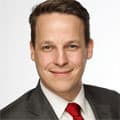Markus is a business consultant who had some experience in data science, mostly with VBA and SQL. But he found himself wanting more from his data—even in college, he'd wondered why some of the engineering principles he studied couldn't be applied to business data. Surely, he thought, there should be a way for data to move beyond reporting into something predictive. He found his answer with DataCamp's courses. He started with an Introduction to R, and from there went on to use the premium courses to learn new skills in data science. Markus plans to take his newfound skills and build new models that can help his business succeed.
What first drew you to the data science industry?
Being a very analytical person, I have always been very interested in quantitative models. I remember when I was studying Industrial Engineering, I asked my Control Theory professor about applying the same models to business problems. He told me it was far too complex to do. But now, as technology becomes more and more advanced, it's possible to create models with business data. I am very happy that my job allows me to learn data science and develop the required skills.
What made you want to learn with DataCamp?
For my work as a business consultant, fast and precise analytics are important. Coming from a strong VBA/SQL Background, I wanted to see what is possible with R and how it could make my life easier. I started with a Coursera course, but quickly left it. The evaluation of your work takes too long, as you are reviewed by your peers. With DataCamp, I got direct feedback for the code I wrote, which led to a faster learning for me.
“I recommend everyone try the free Introduction to R course. It's a fun way to get to know R. I promise you won't be disappointed, and chances are, you'll get hooked!
”
What was your prior experience with data science before joining DataCamp?
As I mentioned, I have experience with SQL and VBA, but more from a reporting and data transformation perspective. DataCamp introduced me to predictive analytics.
What has the value of DataCamp's education been for you?
My courses at DataCamp showed me what is possible in the field of data science. Now I can look at business problems and evaluate if we can solve them with the help of data science.
How do you plan to continue your work and education in data science?
I will foster my knowledge in machine learning and predictive analytics by applying the methods I learned on DataCamp to business settings. Knowing how to do it is one thing, but you definitely need to learn how to build proper, good fitting models. This takes time and a lot of data.
“With DataCamp, I got direct feedback for the code I wrote, which led to a faster learning for me.”
What advice would give to any students who are aspiring data scientists?
I recommend everyone try the free Introduction to R course. It's a great and fun way to get to know R. I promise you won't be disappointed, and chances are, you'll get hooked! When learning with DataCamp, take your time and don't get frustrated. If you get stuck, you can always use R Documentation to get help. But if you already know a programming language, learning R will be really easy.
What do you think the role of R and Python will be in the analytics industry? Will they replace technologies like VBA, or do you think these will co-exist?
From my perspective, I think they will coexist. VBA certainly has some features that would be very complicated to do in R. I think the strength of VBA is that you can use it with the WYSIWYG Microsoft Office suite. It's easy to create some templates in Word or Excel and beef them up with VBA scripts—maybe not from an analytics perspective, but from a data gathering or user interface perspective.
Do you think it will be an essential skill for business consultants to know how to handle their own or clients' data using these open-source technologies?
Within the business consultant sector, you can already see a big shift. Almost every consultancy is either creating dedicated back office teams for data analytics, or it develops consultants as data scientists. In our company, we decided to do the latter. However, not every consultant can be a data scientist, so another goal is to increase the analytics knowledge of the "normal" consultants as well. Long story short: If you want to be successful in business, you certainly need to have a proper understanding of data and data analytics.
